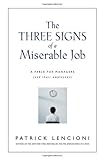Post 4 in the series The Three Signs of a Miserable Job
This week we’ve been working through Patrick Lencioni’s book The Three Signs of a Miserable Job. So far we’ve looked at why this issue is important, what a miserable job is (and how it differs from simply a job you don’t like), and the effects miserable jobs have. Now it’s time to look at what makes a job miserable.
This is important because the things that make a job miserable are often distinct from the activities of the job itself. Hence, getting yourself out of a miserable job doesn’t typically mean you have to change jobs; it often just means you need to change a few things that are relatively simple and low cost.
There are often “three underlying factors that will make a job miserable, and they can apply to virtually all jobs regardless of the nature of the work being done” (Lencioni, 221). These three factors are: anonymity, irrelevance, and immeasurement. In this post I will briefly describe each of these factors; we will look at how to address them in an upcoming post.
1. Anonymity
Lencioni writes:
People cannot be fulfilled in their work if they are not known. All human beings need to be understood and appreciated for their unique qualities by someone in a position of authority. . . . People who see themselves as invisible, generic, or anonymous cannot love their jobs, no matter what they are doing.
Very basic, and very true.
2. Irrelevance
If you don’t feel like your job matters to someone, it will feel irrelevant — and thus miserable. Here’s how Lencioni puts it:
Everyone needs to know that their job matters, to someone. Anyone. Without seeing a connection between the work and the satisfaction of another person or group of people, an employee simply will not find lasting fulfillment.
3. Immeasurement
Why do we like sports so much? One reason is that there is a clear, objective measure for how a team is performing.
But imagine a basketball game where the winner was not determined by the number of points scored, but by the subjective impression of the crowd. That would be miserable because the team — and its fans — would lose the sense that there are objective things that they can do that influence whether they are performing better or worse. Lack of measurement in your job is like playing a game without keeping score.
Here’s how Lencioni puts it:
Employees need to be able to gauge their progress and level of contribution for themselves. They cannot be fulfilled in their work if their success depends on the opinions or whims of another person, no matter how benevolent that person may be. Without a tangible means for assessing success or failure, motivation eventually deteriorates as people see themselves as unable to control their own fate.
In many cases, it comes down to just these three things. If you feel miserable in your job, it may because one or all of these factors is in play: you feel anonymous, you aren’t sure your work matters to anyone, and/or there is no way to measure your progress.
In the next posts, we’ll look at how to address this and what benefits come when you do.
Posts in This Series
- The 3 Signs of a Miserable Job: An Introduction
- What is a Miserable Job?
- What are the Effects of a Miserable Job?
- What Makes a Job Miserable?
- What are the Benefits of Managing for Job Fulfillment?
- Addressing the First Sign: Anonymity
- Addressing the Second Sign: Irrelevance
- Addressing the Third Sign: Immeasurement
